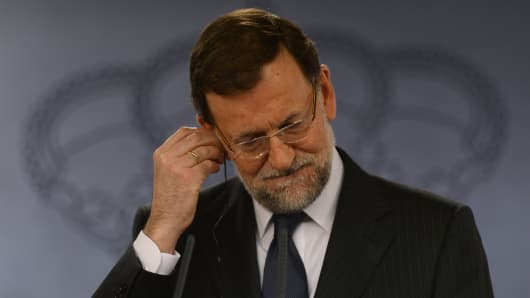Spain's Prime Minister Mariano Rajoy is facing renewed pressure to step down after the country's El Mundo newspaper reported on Monday that he had sent supportive text messages to his party's disgraced ex-treasurer for two months after the eruption of a corruption scandal.
Luis Bárcenas, the former treasurer of Rajoy's Popular Party(PP), is in custody facing trial for corruption and tax fraud, which he denies. Rajoy similarly denies any involvement and says the party never received illegal payments from a slush fund run by Bárcenas.
(Read More: Spain Scandal Returns, as Markets Brace for More Pain)
The allegations from El Mundo come as Bárcenas testifies in court on Monday and as Rajoy continues to attempt to change investors' opinions of the country as it tries to move away from its recession-focused image.
Rajoy has so far avoided any direct implication in the scandal, but these new allegations show a much closer relationship between the prime minister and Bárcenas.
In one text from 2012, Rajoy wrote, "Luis, nothing is easy but we'll do what we can. Cheer up."
In another from January this year, when the slush fund allegations first emerged in the media, Rajoy told Bárcenas, "Luis, I understand. Stay strong. I'll call your tomorrow. A hug."
(Read More: Spain First Quarter GDP Contracts 0.5% vs Fourth Quarter)
Alrfredo Perez Rubalcaba, the leader of the opposition Socialists, said at a press conference, "There have been lies, resounding silence in terms of explanations and collusion, as shown by these text messages."
Rubalcaba called for Rajoy's immediate resignation.
In an interview with El Mundo last week,Bárcenas bragged that he had ample information to bring down Rajoy's government.
Bad timing
The renewal of the scandal comes as Rajoy was attempting to talk-up Spain's economic recovery and create a new mood of optimism. Rajoy's administration has recently spoken of the worst of the crisis being over and that jobs and growth were set to recover.
Last week Rajoy said, "Our economy has turned the corner and we are at the start of a change in trends which will allow us, with effort, to create jobs again. The foundations have been laid."
(Read More: Spain Will Bottom Out This Quarter: Santander Exec)
Last week, the European Commission (EC) said that Spain's banking restructuring program is on track and its economy is stabilizing, despite the difficult macroeconomic conditions.
The EC said there was no need for further aid to recapitalize Spain's state-aided banks. But Ben May, economist at Capital Economics told CNBC that the economic situation was still fragile.
"Despite the recent improvement in some measures of economic activity, we continue to think that the further planned fiscal consolidation and the need for de-leveraging in the private sector will ensure that the economy remains in recession for some time yet," May said.
"Against this backdrop,concerns about the health of the public finances and the banks may grow and eventually force Spain to turn to the [European bailout fund] and ECB for support."
David Lea, senior analyst of Control Risks, pointed out that the El Mundo newspaper has traditionally been close to Rajoy's PP,making the revelations particularly notable.
"To change tack so clearly and focus quite narrowly on Rajoy is something of a surprise," Lea said of El Mundo's coverage.
Lea said that Rajoy's unpopularity, "combined with the austerity program and the ongoing lack of growth is likely to mean that few tears are shed for him if he does fall (which is now possible, if not necessarily likely just yet)."
While a Rajoy resignation is still a matter of political gossip rather than reality, the decline of PP's popularity paves the way towards a cloudy electoral picture in 2015, when the next election is set.
Only 23 percent of Spaniards say they would now vote for the PP, according to a recent poll by Metroscopia (the lowest level since Rajoy came to power in November 2011). But, the opposition Socialists only managed to get 21.6 percent of the support. Clearly, the biggest fallout from Rajoy's scandals and a poor economic performance is an electorate increasingly divided and unwilling to support mainstream parties.
"Essentially I don't think the political situation can make the economic situation much worse in Spain at the moment – but it can ensure that politics suffers an even deeper blow to its reputation and leaves the 2015 election in trouble, with PSOE (the Socialists)yet to recover from its 2011 hammering and the PP's ratings falling sharply since the Bárcenas case kicked-off," Lea said.


